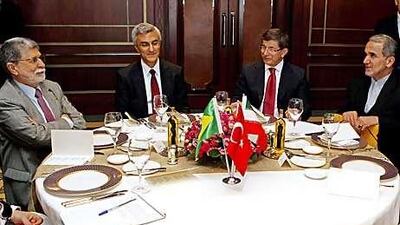Iran proclaimed its readiness to resume nuclear talks with world powers yesterday despite the imposition of harsh new sanctions by the European Union that Tehran said would fail to curb its nuclear programme. The regime is keen to assure the jittery Iranian public that it will be unscathed by a wave of punitive new measures passed by the EU, the United Nations, the United States, Canada and Australia in recent weeks.
The Iranian government does not want to be blamed for any domestic pain resulting from its controversial nuclear policy. "The EU sanctions [passed on Monday] throw further salt on the self-inflicted wound that is [President Mahmoud] Ahmadinejad's mismanagement of the Iranian economy," Ali Ansari, an Iran expert at St Andrews University in Scotland, said in an interview. Mr Ahmadinejad, however, did nothing to calm nerves on another front. He proclaimed, alarmingly, that he expects the US to launch a military strike on "at least two countries" in the Middle East in the next three months aimed at waging "psychological war against Iran".
He did not specify whether he thought Iran itself would be attacked and provided no evidence to support his dramatic claim. Iran, nevertheless, will "resume nuclear talks with the West in September", Mr Ahmadinejad said. But "conditions" that he first stipulated in June still stand - such as the position of world powers on the "Zionist regime's [Israel] atomic bombs". He told Iran's state-run Press TV: "They [western powers] should say whether they consent" to Israel's undeclared nuclear arsenal "or not".
The West and many Arab states suspect Iran's nuclear programme is aimed at weapons development; Tehran insists it is designed solely to generate electricity. The 27-member EU slapped tough new sanctions against Iran's energy and banking sectors in an effort to curb Tehran's nuclear programme and persuade the Islamic republic to return to talks on its atomic activities. Mr Ahmadinejad insisted: "The logic that they can persuade us to negotiate through sanctions is just a failure."
A European former senior envoy to Iran, who was closely involved in earlier nuclear negotiations, agreed that "Iran won't buckle" on suspending uranium enrichment. "What's more important to Iran than pressure of this kind is the nature of any new offer the international community will make, and we don't know whether there's any flexibility on either side," the envoy said in an interview on condition of anonymity.
"At the moment, the Iranians believe the benefits of showing defiance are more than any pain being inflicted." Many Iran experts believe that the sweeping new sanctions, which primarily target the country's vital oil and gas sector, could derail the government's long-heralded but controversial economic reform programme aimed at hauling Tehran out of recession. Due to be launched in September, this involves slashing state subsidies for fuel and basic consumer goods while replacing them with grants for the poor.
But cutting subsidies in the wake of sanctions could ignite social unrest, Iran experts said. "All of this could put Iran in a war embargo footing, even though there is no war," said an Iranian economist in Tehran, who spoke on condition of anonymity. The EU sanctions follow similar measures imposed by the US earlier this month: both go well beyond a fourth set of UN sanctions imposed on June 9 over Iran's refusal to halt uranium enrichment.
Among the EU measures are a ban on the sale of equipment, technology and services to Iran's energy sector. They also restrict private sector interactions with Iran's finance, insurance and transportation sectors. The EU's sanctions are not as stringent as Washington's but are potentially more damaging. The US severed most commercial ties with Iran three decades ago while the EU long remained a major trading partner.
The package was "by some way the most far-reaching sanctions adopted by the EU against any country", EU officials said. Russia, a nominal ally and major trading partner of Iran despite strained relations in recent months, condemned the EU move. "We have already said many times that we consider unacceptable the practice of unilateral or collective sanctions measures against Iran," the Russian foreign ministry said in a statement.
Turkey, meanwhile, has said it will abide by the UN Security Council sanctions but not those imposed by the EU or US. The last high-level talks between Iran and six world powers - the US, Britain, China, Russia, France and Germany - were held in Geneva last October. The two sides reached a tentative accord on a nuclear fuel swap deal that later stalled. Iran said on Monday it was ready to resume talks without conditions on the deal, under which it would ship the bulk of its nuclear fuel abroad in return for plates to power a medical reactor in Tehran.
Mr Ahmadinejad said yesterday that he wanted Brazil and Turkey, which have attempted to resolve the nuclear dispute, to participate in any new negotiations. He did not make clear whether this was a condition for new talks. The EU insists its punitive new measures are part of a dual track approach, primarily aimed at cajoling Iran into a diplomatic solution. Carl Bildt, the Swedish foreign minister, said: "I have yet to meet anyone who thinks that this issue will be sorted out by sanctions alone."
mtheodoulou@thenational.ae
msinaiee@thenational.ae

